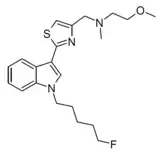PTI-3
Le PTI-3 est un cannabinoïde synthétique à base d'indole -3-thiazole qui a été vendu comme drogue de synthèse[1]. Il a été identifié pour la première fois en Hongrie en 2020[2], et a été rendu illégal en Italie en juin 2021[3].
| PTI-3 | |

| |
Sources et références
- « Fourth generation of synthetic cannabinoid receptor agonists: a summary on the latest insights », Acta Bio-Medica, vol. 92, no 6, , e2021546 (PMID 35075053, PMCID 8823589, DOI 10.23750/abm.v92i6.12696)
- European Monitoring Center for Drugs and Drug Addiction, « New psychoactive substances: global markets, glocal threats and the COVID-19 pandemic. An update from the EU Early Warning System », European Monitoring Centre for Drugs and Drug Addiction (rapport), Luxembourg, Publications Office of the European Union, (DOI 10.2810/921262, lire en ligne)
- (it) « Decreto 1 Giugno 2021. Aggiornamento delle tabelle contenenti l'indicazione delle sostanze stupefacenti e psicotrope, di cui al decreto del Presidente della Repubblica 9 ottobre 1990, n. 309 e successive modificazioni e integrazioni. Inserimento nella tabella I di nuove sostanze psicoattive. (21A03590) (GU Serie Generale n.144 del 18-06-2021) »
- Portail de la médecine
- Portail de la biologie
- Portail de la pharmacie
- Portail sur les psychotropes
Cet article est issu de Wikipedia. Le texte est sous licence Creative Commons - Attribution - Partage dans les Mêmes. Des conditions supplémentaires peuvent s'appliquer aux fichiers multimédias.